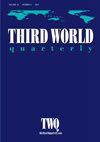COVID-19 and aid distribution in the Philippines: a patron-clientelist explanation
IF 1.8
2区 经济学
Q2 DEVELOPMENT STUDIES
引用次数: 0
Abstract
Republic Act (RA) 11469, also known as ‘The Bayanihan to Heal as One Act', and RA 11494 the ‘Bayanihan to Recover as One Act', or Bayanihan 2, were passed into law in the Philippines as a response to the COVID-19 pandemic. RA 11469 and RA 11494 were fundamentally flawed because they relied on data from Listahanan, the National Targeting System for Poverty Reduction (NHTS-PR). These data gave only partial coverage of those affected by the pandemic and was largely reliant on data gathered in 2009. To plug the gaps data beneficiary identification was devolved to Local Government Units (LGUs) and local government officials. We examine how a lack of state capacity and the technical weaknesses of RAs 11469 and 11494 were capitalised on by an underlying culture of patron-clientelism. This undermined the distribution of relief aid, or ‘ayuda' to urban poor communities in Metro Manila and adjacent provinces. We also identify instances where strategies were devised to circumnavigate such political failings, which offer hope for future good practice. We argue that robust data and enhanced state capacity are essential for the distribution of future relief aid in the Philippines as a means of promoting social equity and limiting political discretion. [ FROM AUTHOR] Copyright of Third World Quarterly is the property of Routledge and its content may not be copied or emailed to multiple sites or posted to a listserv without the copyright holder's express written permission. However, users may print, download, or email articles for individual use. This may be abridged. No warranty is given about the accuracy of the copy. Users should refer to the original published version of the material for the full . (Copyright applies to all s.)新冠肺炎与菲律宾的援助分配:赞助人-客户解释
作为对COVID-19大流行的应对措施,菲律宾通过了第11469号共和国法案(RA),也被称为“巴亚尼汉作为一个治愈法案”,第11494号共和国法案“巴亚尼汉作为一个恢复法案”,或巴亚尼汉2号。RA 11469和RA 11494存在根本性缺陷,因为它们依赖于Listahanan国家减贫目标系统(NHTS-PR)的数据。这些数据仅部分覆盖了受大流行影响的人群,并且主要依赖于2009年收集的数据。为了填补这一空白,将受益人识别数据下放给地方政府单位(lgu)和地方政府官员。我们研究了国家能力的缺乏和RAs 11469和11494的技术弱点是如何被一种潜在的庇护主义文化所利用的。这破坏了向马尼拉大都会和邻近省份的城市贫困社区发放救济援助。我们还指出了为规避这种政治失败而制定战略的实例,这为未来的良好做法提供了希望。我们认为,作为促进社会公平和限制政治自由裁量权的一种手段,可靠的数据和增强的国家能力对于菲律宾未来救济援助的分配至关重要。[来自作者]《第三世界季刊》的版权是劳特利奇的财产,未经版权所有者的明确书面许可,其内容不得复制或通过电子邮件发送到多个网站或发布到listserv。但是,用户可以打印、下载或通过电子邮件发送文章供个人使用。这可以删节。对副本的准确性不作任何保证。用户应参阅原始出版版本的材料的完整。(版权适用于所有人。)
本文章由计算机程序翻译,如有差异,请以英文原文为准。
求助全文
约1分钟内获得全文
求助全文
来源期刊

Third World Quarterly
DEVELOPMENT STUDIES-
CiteScore
4.10
自引率
15.00%
发文量
137
期刊介绍:
Third World Quarterly ( TWQ ) is the leading journal of scholarship and policy in the field of international studies. For almost four decades it has set the agenda of the global debate on development discourses. As the most influential academic journal covering the emerging worlds, TWQ is at the forefront of analysis and commentary on fundamental issues of global concern. TWQ examines all the issues that affect the many Third Worlds and is not averse to publishing provocative and exploratory articles, especially if they have the merit of opening up emerging areas of research that have not been given sufficient attention. TWQ is a peer-reviewed journal that looks beyond strict "development studies", providing an alternative and over-arching reflective analysis of micro-economic and grassroot efforts of development practitioners and planners. It furnishes expert insight into crucial issues before they impinge upon global media attention. TWQ acts as an almanac linking the academic terrains of the various contemporary area studies - African, Asian, Latin American and Middle Eastern - in an interdisciplinary manner with the publication of informative, innovative and investigative articles. Contributions are rigorously assessed by regional experts.
 求助内容:
求助内容: 应助结果提醒方式:
应助结果提醒方式:


